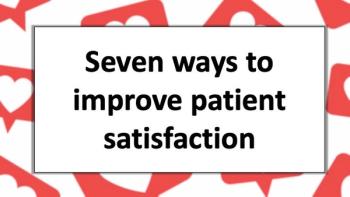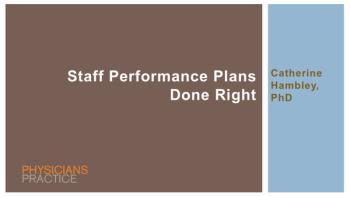
Forming a strategic plan may seem like a waste of time, but it can be beneficial to a practice.

Catherine Hambley, PhD, is CEO of Brain-Based Strategies Consulting, where she specializes in executive coaching, leadership and team development and organizational transformation. Catherine has an extensive background in healthcare, where she works with physicians, nurses and hospital executives to create cultures of learning, collaboration and engagement.

Forming a strategic plan may seem like a waste of time, but it can be beneficial to a practice.

Five essential traits and five essential sets of questions for effective leadership.

Ironically, times of stress are when we need to be on top of our game.

We are not much good to others, if we are not good to ourselves.

The key to patient satisfaction lies in your employees.

Effective teamwork leads to fewer medical errors and better patient care.

The science of personality and why self-awareness matters.

How to alter your approach when dealing with different personality types

If you find yourself growling, scowling or about to explode, try these tactics to improve your mood and (keep your cool).

It’s easy to be a Negative Nancy, but it’s important for the sake of yourself, your staff and your patients that you focus on the positives to build a better workplace culture.

Here are four strategies that can go a long way towards creating a culture where people feel engaged, empowered, and supported. And the happier your staff, the greater your patient satisfaction.

The drivers of burnout are too numerous and complex for any individual physician to address alone. But there are steps physicians can take to reduce their stress levels and improve their cognitive functioning and well-being.

Computerized records are not going away, so it is imperative to develop strategies to mitigate and cope with the stress EHRs are causing-for physicians and for patients.

As the saying goes, it’s not what you said but how you make them feel. Being more conscientious of your delivery can improve communication with patients, staff, and colleagues.

We need people to maximize their thinking at work, but there are numerous aspects of the workplace that inhibit thinking. Fortunately, brain science can shed some light onto why this occurs.

Be aware that the way you present medical information to your patients has a strong influence on their risk perception and, ultimately, their decisions regarding treatment.

In order to reduce the incidence of clinical errors in judgment, physicians should be aware of cognitive biases and practice strategies to mitigate their impact.

How to recognize-and overcome-the common thought process of overconfidence when it comes to practicing medicine.

People don't like being told what to do - they prefer to be encouraged to think through how to best manage a situation.

Here is how you can give your practice staff constructive feedback, helping them build on strengths and discover ways to improve.

If you're nervous about giving a presentation to staff, colleagues, patients, or to the public, here are a few things to know.

Feeling angry and overwhelmed at your practice? Here are six simple actions that can improve your mood.

The less stress you experience, the greater your ability to provide compassionate care, engage positively with your staff, and improve decision making.

Part 1 of a 2-part series on developing a more stress resilient brain and being able to more effectively run your practice.

Show more compassion to patients, enhance your listening skills, and improving your decision-making abilities with mindfulness.

You can't change the trajectory of medicine, but there are strategies you can take to get back to why you went into the field in the first place.

Every practice manager dreads having a difficult conversation with a staff member. Here are some strategies to get through one successfully.

It can be hard to have conversations when patients are non-compliant or being given bad news. Here are some strategies to manage these exchanges.

If you want to leverage the potential of your staff and set them up for success, then help each person plan for excellence by a creating unique performance plans.

The results of the 2016 Great American Physician (GAP) survey are revealing; most physicians don't have enough time for their personal life.

Published: January 6th 2022 | Updated:

Published: January 22nd 2015 | Updated:

Published: February 26th 2015 | Updated:

Published: April 8th 2015 | Updated:

Published: June 10th 2015 | Updated:

Published: August 12th 2015 | Updated: